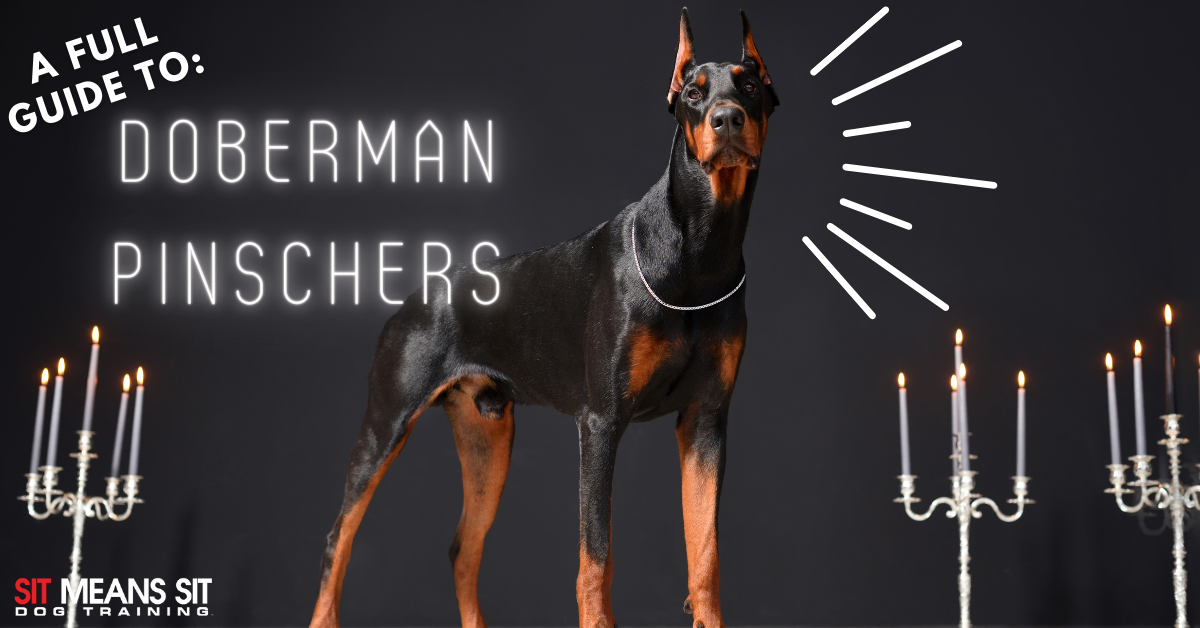
A Full Guide on Doberman Pinschers
Bringing home a dog is a big step in a person’s life that requires a lot of careful consideration and planning. From researching temperament, dietary needs, and overall health of a breed, there is a lot a dog owner needs to know. Especially when bringing home a big dog like a Doberman.
Thinking about bringing home a Doberman Pinscher? Here’s what you need to know.
History
Doberman Pinschers were first bred in Germany in the late 19th century by a man named Louis Dobermann. He was a tax collector and often brought dogs with him in his rounds to protect him from bandits in the area. He began breeding dogs with the idea of making them very loyal and protective. This resulted in the early Doberman Pinscher.
It is unknown what dog breeds were originally used to create the Doberman but scientists speculate that Rottweilers, German Pinschers, and Black and Tan Terriers were part of the mix.
After Louis Dobermann died in 1894, breeders took over breeding the Doberman Pinscher but focused on the function rather than the appearance of the dog. Their goal was to create a “super dog” that would be the bravest, smartest, quickest, and toughest of all the others dogs. Their success in doing this became a bit over the top when the breed then became known for being stubborn and aggressive.
A new breeder, Otto Goeller came along to breed the Doberman into a more functional breed and in 1900, the Dobie was added to the German Kennel Club.
In 1908, the first Doberman came to the United States, and according to legend, won three consecutive “Best in Show” titles before any judge even dared to open its mouth and check its teeth.
During the world wars, many Dobermans were brought to the US as people in Europe couldn’t afford to keep such a large dog. Some think, that if it hadn’t been for this large importation of this breed, it would be extinct today.
Over the past century, breeders have worked hard to take the edge off of the Doberman’s personality and the result is that Dobies are not protective of their family and home, affectionate, and loyal companions.
Quick Facts
- Height: 24 to 28 inches tall at the shoulder
- Weight: 60 to 80 pounds
- Life Span: 10 to 13 years
- Breed Category: Working Dogs
- Shedding: Yes
Temperament and Personality
The Doberman is a super intelligent and super active dog. They are extremely loyal, trustworthy, playful, and loving. This breed is very protective over its family and won’t hesitate to act if they find something or someone to be a threat, but they are not aggressive without reason.
Training a Dobie is very easy due to their high intelligence. However, because they learn so fast, they can bored and it can be difficult to keep them interested in something for long. However, it takes them a while to mature and they remain very puppyish until about three or four years old.
Dobermans need socialization from an early age to make sure they are as well-rounded as possible. Exposing them to different people, sights, sounds, and experiences when they are young will greatly improve their behavior as an adult. You could do this by enrolling them in puppy classes, taking them to bust parks, inviting people over to your house, and taking them to stores and restaurants that allow dogs.
Health
Dobies are generally very healthy, but like all dog breeds, are prone to certain ailments.
- Von Willebrand’s Disease: a blood disorder that interferes with the blood’s ability to clot
- Hip Dysplasia: a condition where the thighbone doesn’t fit snugly in the hip joint
- Progressive Retinal Atrophy: eye disease that involves the gradual deterioration of the retina
- Wobbler’s Syndrome: spinal cord compression caused by cervical vertebral instability or from a malformed spinal canal.
Care
Doberman Pinschers are very high-energy dogs that need a lot of exercise. They are best suited to homes in suburbs or rural areas where they will have room to run around. They will need a home with a fenced-in yard to keep them safe, as well as to keep safe the people and animals who may wander by the yard.
They should not be left alone for a long time or delegated to be outside dogs. Dobies want to be treated as part of the family and participate in family activities.
Public perception of Dobermans is usually of fear or hesitation. Be sensitive to this and keep your Dobie leashed in public spaces.
This breed requires minimal grooming. Their coat does shed so weekly brushing is necessary, however bathing your Doberman is not required frequently. As for their teeth, try to brush their teeth a few times a week to prevent tartar buildup and bacteria in their mouths.
Overall, the Doberman Pinscher is a wonderful family dog. They are often purchased without a clear understanding of all that goes into caring for a Doberman, however, if you think your family is sufficiently prepared to take on the responsibility of a Dobie, try rescuing instead! For more information about this breed, visit the Doberman Pinscher Club of America.
